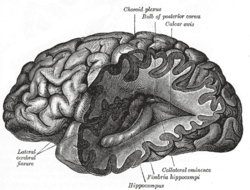Clinical neuroscience
Clinical neuroscience is a branch of neuroscience that focuses on the fundamental mechanisms that underlie diseases and disorders of the brain and central nervous system.[1] It seeks to develop new ways of diagnosing such disorders and ultimately of developing novel treatments.
Clinical neuroscientists — including psychiatrists, neurologists, clinical psychologists, and other medical specialists — use basic research findings to develop diagnostic methods and ways to prevent and treat neurological disorders.[2] Such disorders include addiction, Alzheimer's disease, amyotrophic lateral sclerosis, anxiety disorders, attention deficit hyperactivity disorder, autism, bipolar disorder, brain tumors, depression, Down Syndrome, dyslexia, epilepsy, Huntington's Disease, multiple sclerosis, neurological AIDS, neurological trauma, pain, obsessive-compulsive disorder, Parkinson's disease, schizophrenia, sleep disorders, stroke and Tourette Syndrome.[3]
While neurology, neurosurgery and psychiatry are the main medical specialties constituting clinical neuroscience, other medical specialties such as neuroradiology, neuropathology, ophthalmology, otorhinolaryngology, anesthesiology and rehabilitation medicine can be considered part of the discipline.[4][5]
One Mind for Research
The "One Mind for Research" forum was a convention held in Boston, Massachusetts on May 23–25, 2011 that produced the blueprint document A Ten-Year Plan for Neuroscience: From Molecules to Brain Health.[6][7] Leading neuroscience researchers and practitioners in the United States contributed to the creation of this document, in which 17 key areas of opportunities are listed under the Clinical Neuroscience section. These include the following:
- Rethinking curricula to break down intellectual silos
- Training translational neuroscientists and clinical investigators
- Investigating biomarkers
- Improving psychiatric diagnosis
- Developing a “Framingham Study of Brain Disorders” (i.e. longitudinal cohort for central nervous system disease)
- Identifying developmental risk factors and producing effective interventions
- Discovering new treatments for pain, including neuropathic pain
- Treating disorders of neural signaling and pathological synchrony
- Treating disorders of immunity or inflammation
- Treating metabolic and mitochondrial disorders
- Developing new treatments for depression
- Treating addictive disorders
- Improving treatment of schizophrenia
- Preventing and treating cerebrovascular disease
- Achieving personalized medicine
- Understanding shared mechanisms of neurodegeneration
- Advancing anesthesia
In particular, it advocates for better integrated and scientifically driven curricula for practitioners, and it recommends that such curricula be shared among neurologists, psychiatrists, psychologists, neurosurgeons and neuroradiologists.[8]
Given the various ethical, legal and societal implications for healthcare practitioners arising from advances in neuroscience, the University of Pennsylvania inaugurated the Penn Conference on Clinical Neuroscience and Society in July 2011. [9]
See also
References
- ↑ UCL Clinical Neuroscience
- ↑ Society for Neuroscience - What is Neuroscience?
- ↑ Society for Neuroscience - Brain Facts
- ↑ University of Pennsylvania Clinical Neuroscience Track
- ↑ UCL Clinical Neuroscience
- ↑ One Mind for Research
- ↑ A Ten-Year Plan for Neuroscience: From Molecules to Brain Health
- ↑ "Overview of Neuroscience Institute". Neuroscience Institute. Retrieved 5 May 2015.
- ↑ Penn Conference on Clinical Neuroscience and Society
